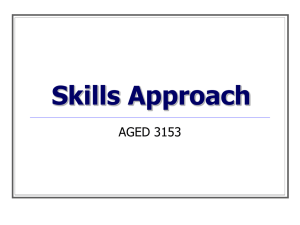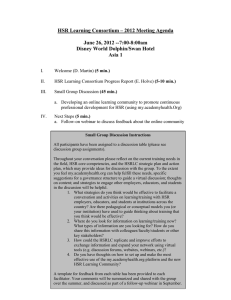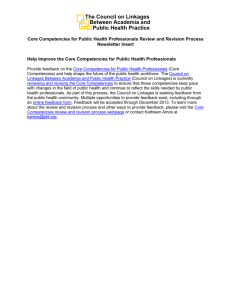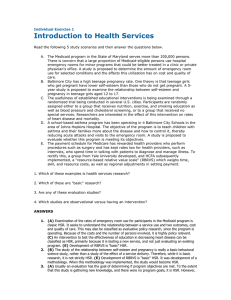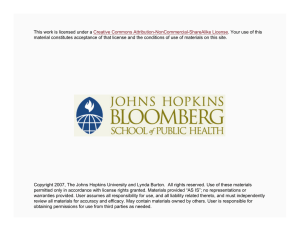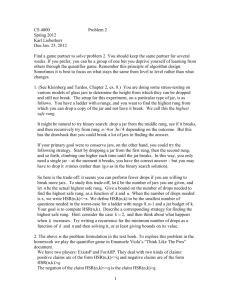Health Services Research Core Competencies for Physical Therapy
advertisement
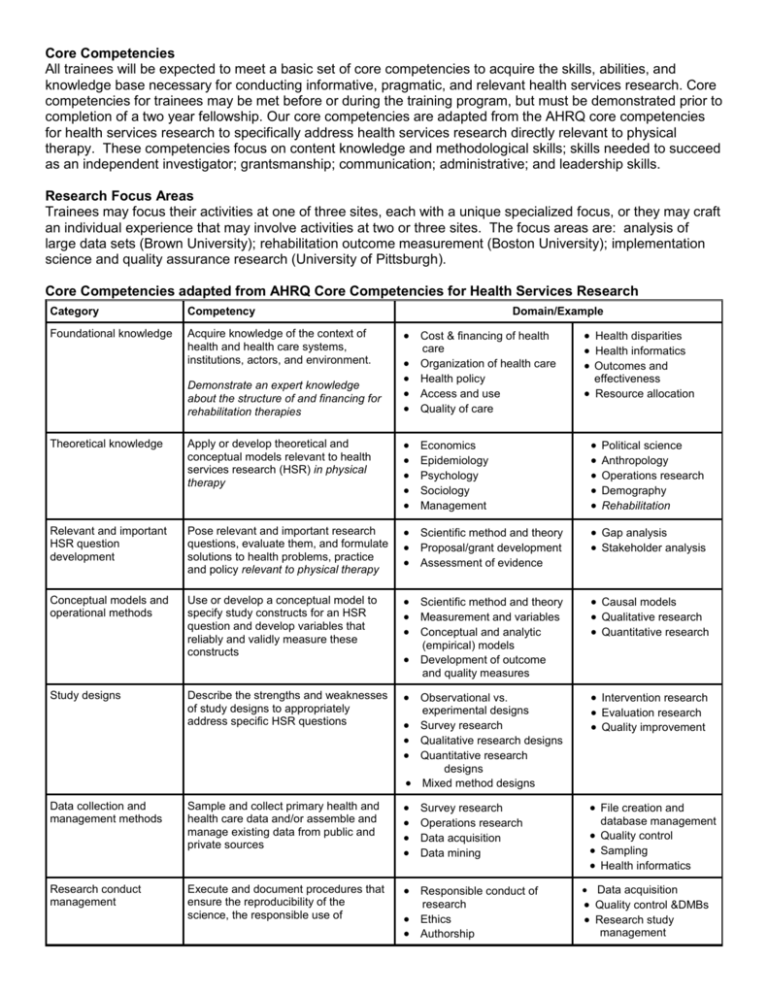
Core Competencies All trainees will be expected to meet a basic set of core competencies to acquire the skills, abilities, and knowledge base necessary for conducting informative, pragmatic, and relevant health services research. Core competencies for trainees may be met before or during the training program, but must be demonstrated prior to completion of a two year fellowship. Our core competencies are adapted from the AHRQ core competencies for health services research to specifically address health services research directly relevant to physical therapy. These competencies focus on content knowledge and methodological skills; skills needed to succeed as an independent investigator; grantsmanship; communication; administrative; and leadership skills. Research Focus Areas Trainees may focus their activities at one of three sites, each with a unique specialized focus, or they may craft an individual experience that may involve activities at two or three sites. The focus areas are: analysis of large data sets (Brown University); rehabilitation outcome measurement (Boston University); implementation science and quality assurance research (University of Pittsburgh). Core Competencies adapted from AHRQ Core Competencies for Health Services Research Category Competency Foundational knowledge Acquire knowledge of the context of health and health care systems, institutions, actors, and environment. Demonstrate an expert knowledge about the structure of and financing for rehabilitation therapies Domain/Example Cost & financing of health care Organization of health care Health policy Access and use Quality of care Economics Epidemiology Psychology Sociology Management Health disparities Health informatics Outcomes and effectiveness Resource allocation Theoretical knowledge Apply or develop theoretical and conceptual models relevant to health services research (HSR) in physical therapy Relevant and important HSR question development Pose relevant and important research questions, evaluate them, and formulate solutions to health problems, practice and policy relevant to physical therapy Scientific method and theory Proposal/grant development Assessment of evidence Gap analysis Stakeholder analysis Conceptual models and operational methods Use or develop a conceptual model to specify study constructs for an HSR question and develop variables that reliably and validly measure these constructs Scientific method and theory Measurement and variables Conceptual and analytic Causal models Qualitative research Quantitative research Political science Anthropology Operations research Demography Rehabilitation (empirical) models Development of outcome and quality measures Study designs Data collection and management methods Research conduct management Describe the strengths and weaknesses of study designs to appropriately address specific HSR questions Observational vs. experimental designs Survey research Qualitative research designs Quantitative research designs Mixed method designs Sample and collect primary health and health care data and/or assemble and manage existing data from public and private sources Survey research Operations research Data acquisition Data mining Execute and document procedures that ensure the reproducibility of the science, the responsible use of Responsible conduct of research Ethics Authorship Intervention research Evaluation research Quality improvement File creation and database management Quality control Sampling Health informatics Data acquisition Quality control &DMBs Research study management resources, and the ethical treatment of research subjects Data analysis Demonstrate proficiency in the appropriate application of analytical techniques to evaluate HSR questions Conflict of interest Research integrity Human subjects/IRBs HIPAA Contracts, MOUs, DUAs Quantitative &qualitative research Analysis of approaches for delivering and/or paying for care Economic evaluation CEA/CBA Statistics, biostatistics & econometric methods Estimation and prediction methods Operations research and decision sciences Organizations as subjects Health care law and risk management Budget development and management Analysis of complex samples Advanced qualitative analytic methods Advanced quantitative analytic methods Meta-analysis Professional development Work collaboratively in teams within disciplines, across disciplines, and/or with stakeholders Teamwork Leadership Team management Conflict resolution Knowledge management Project management Negotiation Communication Effectively communicate the process, findings, and implications of HSR through multiple modalities with stakeholders Proposal development Dissemination Communication skills Marketing and persuasion techniques Writing skills Scientific writing Cultural sensitivity Knowledge transfer Knowledge translation to policy and practice Evidence based practice Evidence based policy Health marketing Implementation science Translational research
